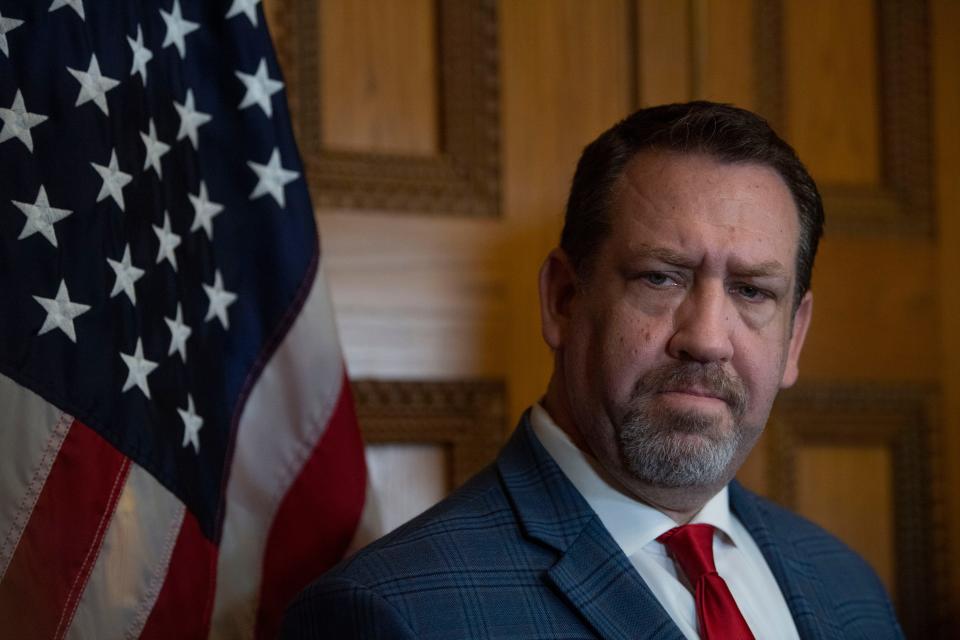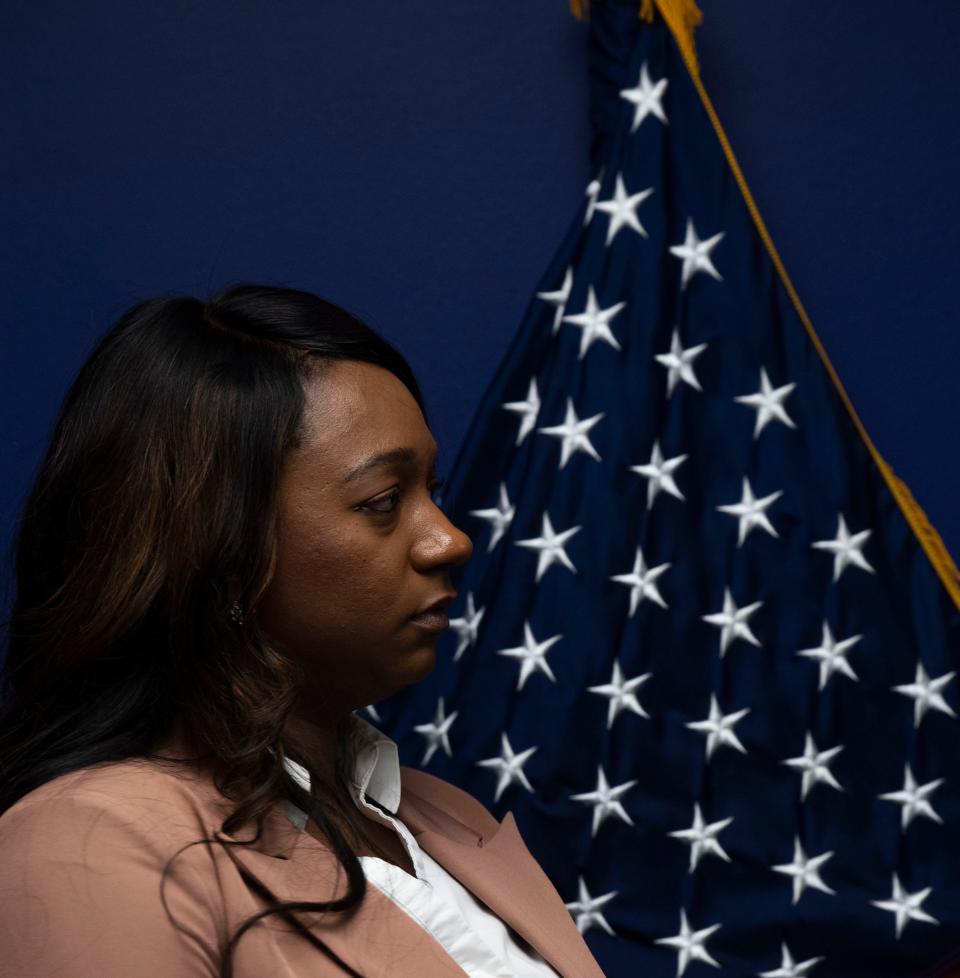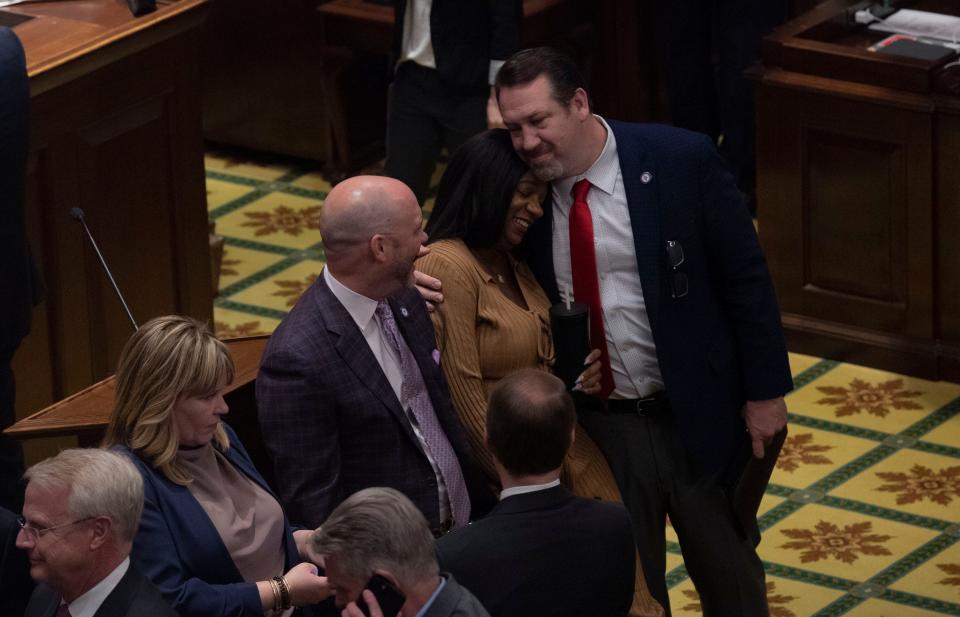Will Tennessee legalize cannabis after federal declassification? Where lawmakers fall
As federal agencies move to reclassify marijuana to allow doctors to prescribe the drug, Tennessee lawmakers remain divided on whether the state should change its laws and allow patients to legally access medical cannabis.
Earlier this month, the U.S. Justice Department submitted notice of a proposed rule to the Federal Register, triggering a 60-day comment period on reclassifying marijuana from Schedule 1, alongside meth and heroin, to Schedule 3 alongside steroids. It would make it legal for doctors to prescribe it for medical purposes. Marijuana has been classified as a Schedule 1 drug since the Controlled Substances Act of 1970.
Tennessee House Republican Caucus Chair Jeremy Faison, R-Cosby, is one of a handful of lawmakers praising the action.
“I think this is an excellent move on the federal government’s part. It needs to happen,” Faison said. “There are many Tennesseans who have been safely using the cannabis plant for various and sundry reasons. This allows research now to prove the overwhelming anecdotal evidence that cannabis is a viable option for people who are sick.”

Faison said reclassifying cannabis will open doors for universities to do clinical trials – some of which could happen in Tennessee.
“We don't have published, double-blind studies of the benefits or the non-benefits of the use of this plant medicinally,” he said. “My gut is that when that happens, that state of Tennessee will be open to allow our universities to do studies.”
Senate Minority Leader Raumesh Akbari, D-Memphis, served on the Biden campaign’s criminal justice reform task force ahead of the Democratic National Convention in 2020, which recommended rescheduling the drug.
“Next year, the Tennessee legislature has an opportunity to align our laws with these forward-looking rule changes and we should take immediate action,” Akbari said. “There is no time like now to address the disproportionate harm done to our communities by our state’s foolish and outdated marijuana laws.”

Sen. London Lamar, D-Memphis, called reclassification "a historic decision driven by common sense."
“Republican lawmakers have kept Tennessee in the dark ages on marijuana policy – wasting our tax dollars locking people up for a plant," Lamar said. "While my ultimate goal is still legalization in Tennessee, this is incredible news for folks who would benefit right now from natural medical cannabis to treat chronic pain or illness.”
What does reclassification mean for medical cannabis in Tennessee?
Tennessee is one of seven states without a medical cannabis program, and one of the only states without a program in the Southeast. Efforts to establish a medical cannabis program in Tennessee have failed in the Republican-dominated state legislature.
Federal reclassification to Schedule 3 would, for the first time at the federal level, acknowledge the drug’s medical benefits and allow the drug to be prescribed by doctors.
But in Tennessee, possession of marijuana containing greater than 0.3% THC would remain illegal, punishable by up to one year in jail and a fine of $2,500. Fines are lower for possession of a half ounce or less.
Cannabis extracts and hemp-derived products with less than 0.3% THC are legal for anyone in Tennessee. Patients with certain diseases, including cancer, epilepsy, Alzheimer's, and Parkinson’s, are already legally allowed in Tennessee to possess oils containing less than 0.9% THC, if they have a valid doctor’s note.
The Tennessee Medical Cannabis Commission, created by statute in 2021, has recommended more broad legalization.
In 2022, the commission recommended allowing patients diagnosed with certain diseases to register for a qualified patient identification card, giving patients and their designated caregivers immunity from arrest, prosecution, or penalty for the possession or use of medical cannabis. Schools, landlords and employers would be prohibited from discriminating against applicants based on their status as a qualified patient.
So far, the commission’s legalization proposal has not gained momentum in the Republican-controlled legislature.
Democrats in the state legislature have repeatedly proposed decriminalizing possession of very small amounts of marijuana, but those proposals have been voted down in the Republican-controlled legislature.
Top GOP leaders split despite federal move
Faison, who proposed a bill in 2018 that would have allowed prescriptions of medical cannabis to treat certain illnesses like epilepsy, said cannabis can offer patients “a safe alternative to pills.”
“This opens up an avenue of treating pain in a safe way," Faison told The Tennessean in an interview. "It opens up an avenue for us to figure out the best modalities, the best dosages. This is a good thing for people who live in chronic pain. This is a good thing for people with epilepsy."

A small but growing number of Republicans have supported medical legalization in recent years. Rep. Bryan Terry, R-Murfreesboro, Rep. Iris Rudder, R-Winchester, and Sen. Janice Bowling, R-Manchester, have sponsored bills seeking to legalize cannabis for medical purposes. Sens. Kerry Roberts, R-Springfield, Mark Pody, R-Lebanon, and Ed Jackson, R-Jackson, have supported medical cannabis legislation in the past.
“In Appalachia, where I live, entire families have been wiped out because of opiates,” Faison said. “If we’re honest with each other, legal drugs have killed hundreds of thousands of Americans. Hundreds of thousands of people abuse legal drugs. I don’t think you’re going to find too many people who are dead because they use cannabis.”
While there’s a contingent in the supermajority supporting legalization, top state leaders aren’t ready to budge. Gov. Bill Lee, and the speakers of both the House and Senate remain skeptical.
“It’s hard to know what’s going to happen at the federal level: a lot of things proposed in Washington never happen,” Lee told reporters last week. “I think as of now, some of the proposed changes will allow for greater study – it doesn’t change the situation in our state. I don’t see that situation changing anytime soon.”

Connor Grady, a spokesperson for House Speaker Cameron Sexton, R-Crossville, indicated that the rescheduling would “allow pharmaceutical companies to start the process of making it for medical purposes through a prescription process.” Grady asserted that if rescheduled, “state legislation isn’t needed to make it medical.”
Lt. Gov. Randy McNally, R-Oak Ridge, has said repeatedly that no discussion on medical marijuana can happen until the federal government reclassifies it away from Schedule 1.
McNally indicated that rescheduling “would only start the conversation in my mind. It would not end it," adding that there would “still be many issues to resolve,” if the rescheduling moves forward, including recommended dosages and rules regarding dispensation.
“But marijuana has not been downgraded at this time,” McNally said. “If the drug is actually removed from Schedule 1, I would be willing to reengage in the conversation. But until that day, the situation remains the same and so does my position.”
A path toward recreational legalization?
While federal rescheduling may prompt movement toward legalization of medical marijuana in Tennessee, broad authorization of the drug for recreational purposes isn't likely.
“I don’t see us as a state going there any time soon,” Faison said. “I think if the way some states out West have done it – just opening it up to where you can just do drugs – it’s not been beneficial to society.”
Grady, Sexton's spokesperson, agreed, saying “controlled substances are never recreational.”
Vivian Jones covers state government and politics for The Tennessean. Reach her at vjones@tennessean.com or on X and Threads @Vivian_E_Jones.
This article originally appeared on Nashville Tennessean: Medical marijuana in Tennessee: GOP leaders split, Democrats support

